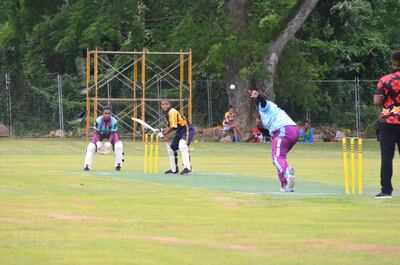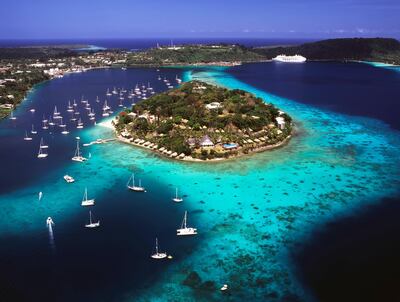Live cricket will be screened again later this month.
Not played between international household names in a sterile, bio-secure stadium, in a bid to claw back some of the millions in lost revenue in the professional game.
And not in front of especially big crowds either. Although the gates will be open, and spectators welcome to attend.
Instead, it will be on a scenic archipelago in the South Pacific, 3,620kms from Australia, which is the nearest of cricket’s established nations.
Rather than an extreme attempt at quarantining the game from the global pandemic, it will just be another day of cricket in Vanuatu.
The island nation is one of the few in the world to have avoided coronavirus infections.
A pre-emptive lockdown meant the virus did not make it to the country, and the borders remain closed.
Covid-19 has had an effect. The economy is in many ways reliant on tourism, so the lack of arrivals is providing a financial strain.
But the absence of a need for physical distancing has meant many other activities have been able to continue – including cricket.
Matches have already been broadcast via an online livestream. When it did so last month, it was one of the only live sporting events anywhere in the world.
As such, there was an unprecedented interest in the cricketers of Mele Village and Port Vila.
The population of the country is around 300,000, yet the livestream attracted nearly half a million views.
“We were somewhat surprised, but we had an inclination it could be followed with huge interest, that’s why we thought we would stream it and open it up to everyone,” said Shane Deitz, the Australian former first-class cricketer who is the chief executive of Vanuatu Cricket.
“I keep hearing on the news and online that people are desperate for live sport. So, really it was an easy decision.

Sponsorship
“We just only had a few days to pull it together, and we had never done anything like this before. We just had a crack and the final product was pretty good, I think.
“The numbers are huge, and the amount of interest and messages we have received it’s been great for the country and cricket here.”
Interest included coverage in the New York Times, while the ICC have calculated that the collective media response had a reach of 793 million worldwide.
The next matches are planned for May 21, and the intention is to go global with viewership again.
“I am sure most people would never have even heard of Vanuatu, let alone cricket here,” Deitz said.
“I hope that helps tourism here, and I hope people here will now know this wonderful country.
“We want to do it [broadcast matches] again, and we will.
"The cost to do it a bit more regularly is a problem, but we are working on securing a sponsorship to run a T10 tournament over five weeks.
“We want to bring this to the world and showcase the talent that we have.”
Talent that he hopes could one day fuel an appearance at a major global competition for the Vanuatu national team.
Papua New Guinea are due to play at the T20 World Cup in Australia in October, and he says they are an inspiration.
“We have goals to compete in World Cups,” he said.
Popularity
“PNG are in the next World Cup, and if we keep developing and improving we have no excuse why we can’t do it for our men and women. It would help if the World Cup went to 16, or, like football, 32 teams.”
Cricket has gained such popularity in recent years – Deitz ranks it as second most popular in Vanuatu, behind football and just ahead of beach volleyball and tennis – that the limited playing facilities in the country get heavy traffic.
The season already stretches from February to December as they do their best to accommodate everyone who wants game time.
The lack of the sort of interruptions that have been felt everywhere else in the world has been fortunate, but Deitz says everyone is aware of the wider health situation.
“There was a sense of fear, and still is,” Deitz said.
“Our medical facilities aren’t like many places around the world, so if we had a major breakout of the virus it would be very dangerous being here.
“We had three weeks of a state of emergency here including 9pm curfew, only essential businesses were open so very much the same as the rest of the world.
“Our borders were closed early and all incoming passengers had to spend 14 days in quarantine at a local hotel.
“This worked as we have had no positive tests confirmed, and some restrictions were lifted.
“Now most businesses are open and things are somewhat normal.
“We heavily rely on tourism, but with borders shut it puts a huge amount of pressure on the economy.”











